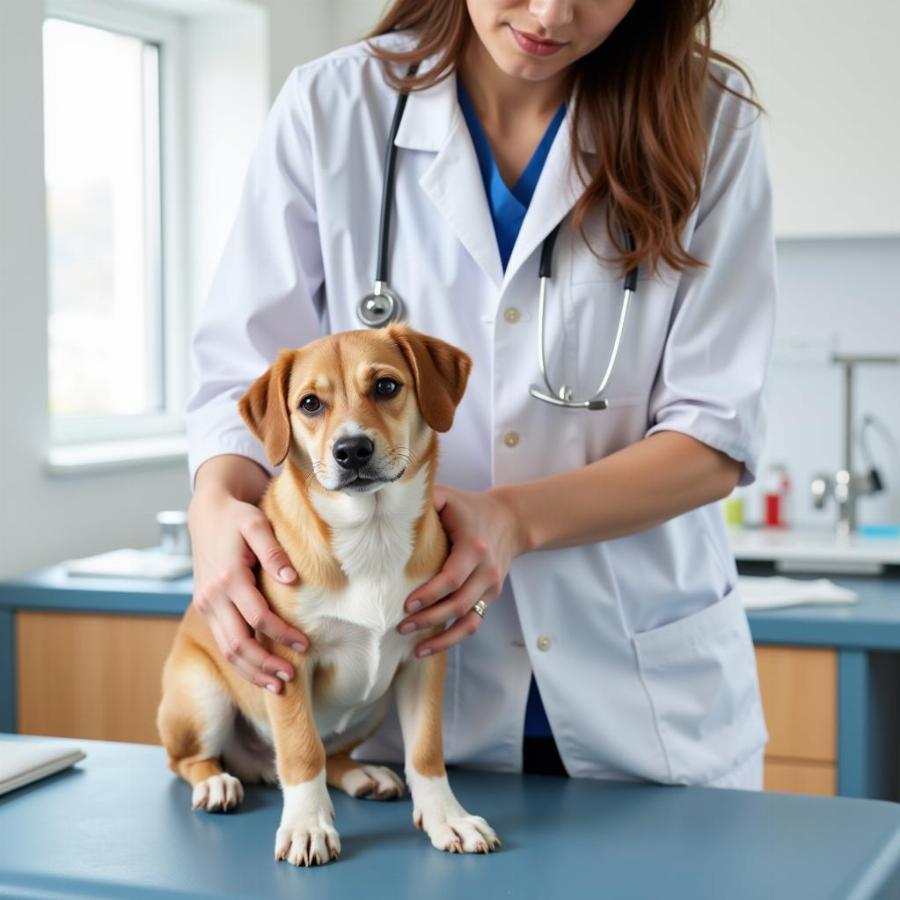Has your furry best friend suddenly become wary or distant? It can be heartbreaking to wonder, “Why is my dog afraid of me?” when they used to greet you with enthusiastic tail wags. Rest assured, this is a common issue, and with understanding and patience, you can rebuild trust and strengthen your bond.
Dogs, unlike humans, primarily communicate through body language. What we might perceive as fear could stem from various reasons, often unrelated to any intentional harm on our part. Let’s explore some common triggers for fear-based behaviors in dogs and how to address them.
Understanding the Roots of Fear in Dogs
Before we delve into specific situations, it’s important to remember that fear in dogs often stems from:
- Past Trauma: Previous negative experiences, like abuse or abandonment, can leave lasting emotional scars, causing a dog to be fearful in seemingly ordinary situations.
- Lack of Early Socialization: Puppies who haven’t been exposed to diverse people, environments, and experiences during their critical developmental period might find unfamiliar situations frightening.
- Breed Predispositions: Some breeds are naturally more sensitive or prone to anxiety than others, making them more likely to react fearfully to certain stimuli.
- Medical Conditions: Underlying health issues can cause pain, discomfort, or changes in behavior, potentially leading to fear or aggression.
Common Reasons Your Dog Might Be Afraid of You
While it can be distressing to witness, understanding the cause is the first step toward resolution. Here are some reasons your dog might be acting fearful:
1. You’re Moving Too Fast
Dogs thrive on predictability. Sudden movements or loud voices can be startling, especially for sensitive dogs. Approaching your dog quickly, even with the best intentions, can trigger a fear response.
Solution: Move slowly and calmly around your dog, avoiding direct eye contact initially. Crouch down to their level instead of towering over them. Speak softly and use their name in a happy, reassuring tone.
2. They Associate You with Negative Experiences
Have you recently punished your dog or ended a fun activity abruptly? They might be associating your presence with that negative experience, leading to fear or avoidance.
Solution: Focus on positive reinforcement. Reward desired behaviors with treats, praise, and gentle petting. Avoid punishment-based training methods, as they can exacerbate fear and damage your bond.
3. You Smell Unfamiliar
Dogs have an incredible sense of smell, far superior to ours. If you’ve been around other animals, used strong scents, or changed your usual body products, your dog might be reacting to the unfamiliar smell.
Solution: Try to maintain a consistent scent profile, especially when interacting with your dog. If you’ve been around other animals, wash your hands and change your clothes before approaching them.
4. They’re Experiencing Physical Discomfort
Just like us, dogs can experience pain or discomfort due to illness or injury. If your dog suddenly becomes fearful or withdrawn, it’s crucial to rule out any underlying medical conditions.
Solution: Look for other signs like changes in appetite, energy levels, or bathroom habits. If you suspect your dog might be unwell, consult your veterinarian immediately.
 Veterinarian examining a dog
Veterinarian examining a dog
Building Trust and Reassuring Your Fearful Dog
Rebuilding trust takes time and consistency. Here are some tips to help your dog feel safe and secure:
- Create a Safe Space: Provide your dog with a designated “safe zone,” such as a crate or a cozy corner, where they can retreat and de-stress without being disturbed.
- Use Positive Reinforcement: Reward calm, relaxed behavior with treats, praise, and gentle petting. This helps your dog associate your presence with positive experiences.
- Be Patient and Consistent: Avoid forcing interactions. Let your dog approach you at their own pace, and avoid making any sudden movements or loud noises that might startle them.
- Seek Professional Help: If your dog’s fear is severe or doesn’t improve with these techniques, consult a certified dog behaviorist or veterinarian specializing in animal behavior. They can provide personalized guidance and support tailored to your dog’s specific needs.
When to Seek Professional Help
While many cases of fear can be addressed with patience and understanding, some situations require professional intervention. If your dog exhibits any of the following, consult a professional:
- Intense Fear Responses: Excessive panting, shaking, drooling, hiding, or aggression.
- Sudden Onset of Fear: Significant behavioral changes without an apparent trigger.
- Fear Interfering with Daily Life: Inability to eat, sleep, or go outside without extreme anxiety.
Beaut Dogs: Your Partner in Dog Parenthood
Beaut Dogs is your comprehensive resource for all things dog-related. We’re committed to providing you with reliable, expert-driven information to help you understand, care for, and build a strong bond with your canine companion. For personalized guidance and support, reach out to us at [email protected]. We’re here to help you navigate the joys and challenges of dog parenthood.